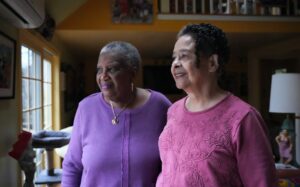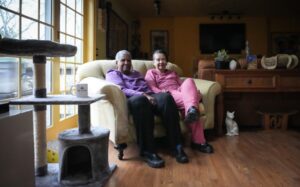PROVINCETOWN — Ngina Ruth Lythcott has been named the 2023 Tim McCarthy Human Rights Champion. She’ll receive the award at a breakfast hosted by the Barnstable County Human Rights Advisory Commission on Jan. 8.

“Ngina epitomizes the spirit of Tim McCarthy,” says Jay Critchley, founder of the Provincetown Community Compact, which manages the Tim Fund, the organization behind the award. The fund was established in memory of the late HIV-AIDS activist who countered homophobia with documentary videography.
The award recognizes Lythcott for her more than 20 years of work on Black women’s health, with students and schools, including nine years on the Provincetown School Committee, and with Barnstable County police captains. Lythcott has also been central in planning the town’s Juneteenth events.
She did not earn the award alone, Lythcott says. She credits a long list of teachers and mentors with shaping her approach to social change — among them her wife, Byllye Avery, who received a MacArthur Foundation “genius” grant for her work revolutionizing Black women’s health care in 1989.
The couple share three children, two black-and-white cats, and one grandson, whose college graduation they attended in Tampa, Fla. last week. They have both had careers as advocates focused on reproductive and racial justice.
Lythcott and Avery, who married at the Pilgrim Monument in 2005, met almost 40 years ago in Atlanta at a meeting of the Black Women’s Health Project (now Health Imperative), an initiative Avery had just started. Lythcott had recently arrived in the city for her then-husband’s appointment as dean of Morehouse University Medical School. She was fresh off a job at Dartmouth College and had done grassroots advocacy work for Planned Parenthood of New England. While she was at Dartmouth, she won a $5 million grant from the Kaiser Family Foundation to implement a model of community development she had begun to devise during her doctoral studies at UCLA.
Lythcott brought the project to Atlanta, where she focused on an under-resourced public housing project called Carver Homes. She was drawn to it because, she says, everyone told her it was a lost cause. “People said, ‘Don’t go there.’ Trash wasn’t collected. The school bus wasn’t stopping,” she says.
Unlike previous projects she had spearheaded, Lythcott says, this time she couldn’t get through to the women she was trying to reach. “They were so depressed that all they could do was get their children out of the house for school in the morning,” she says.
Lythcott knew she had to change her approach. That came, she says, through her relationship with Avery.
Avery introduced Lythcott to self-help, then a relatively radical concept not only in psychology but in public health. Instead of focusing on community outcomes, self-help allowed individual experiences to be put on the table. This had rippled out from sessions at the 1983 First National Conference on Black Women’s Health Issues, an event Avery organized at Spelman College and which was the subject of a Nov. 11 story in the New York Times.
In one photo from the conference, a banner strung behind the podium proclaimed: “We are sick and tired of being sick and tired.” The conference explored the link between Black women’s health and racism, their disproportionately high rates of hypertension, diabetes, and cervical cancer, among other diseases, and the ways they were systematically excluded from reproductive health and mental health services.

One session, Lythcott recalls, asked those present what they adored about themselves. Few could answer the question. Avery says that was because Black women had been conditioned by family, church, and society to care for everything except themselves. “When the world repeatedly tells you that you aren’t enough, you start to believe it,” she says.
When Lythcott adopted Avery’s approach, inviting the women of Carver Homes to meet in small groups to talk about what their lives really looked like behind the scenes, she found their stories often included experiences of abuse and mental illness. “Black women were taught to be the muses of the world,” says Avery. “We taught them how to start to put themselves first.”
Within six months, the Carver Homes community was transformed from the inside out, Lythcott says.
Organizing this way worked for three reasons, she says: “First of all, you don’t die holding onto a secret. Second, two or three other people often have the same story. Third, you’re in a safe space to cry and wail.” The approach she and Avery call “co-counseling” meant the women were no longer alone in their private struggles.
In their Provincetown home, cozily enveloped in the scents of woodsy Nag Champa incense and fresh-brewed Nespresso, Lythcott and Avery show a visitor their art collection. It is a mosaic of their histories, both individual and shared. In the retelling, they often finish one another’s sentences.
In one corner of the dining room is a mahogany statue of a father and son from Tanzania. Lythcott lived there in the early 1970s after finishing degrees in nursing and social work. That is where she came to be called Ngina, she says. After she helped a woman address her baby’s protein deficiency with a change of diet, people came to her with cuts, bruises, and burns. Instead of treating them directly, she collaborated with the local healer, making it clear that she was there to support his work, not take over. People started calling her Ngina, a Bantu word meaning “one who serves.”
Later, when Lythcott was out in the bush doing project evaluation, local children followed her around, calling out “mzungu,” which meant “white lady.” Lythcott is Black, but they saw her as different, an American and an outsider. An older woman suddenly emerged from a hut and addressed the children: “ ‘Do you not recognize your auntie? She was taken from us long ago. Ask her what it is like to cross the ocean,’ ” says Lythcott.
As Lythcott puts it, she arrived in the village holding the name Ngina under her arm and left with it sewn into her soul. Fifty years later, Lythcott says that moment of recognition was the most pivotal in her life up to that point.
On the butter-yellow walls of their dining room are a Howard University exhibit poster for the artist Loïs Mailou Jones, a photograph of Avery’s grandfather, who tapped Georgia pine trees for turpentine, and a print depicting the 1839 Amistad revolt, in which 53 men kidnapped from Sierra Leone rose up against their captors on a schooner en route to the slave trade capital of Havana, Cuba. Their case was heard in the United States, and the Supreme Court decided in their favor. The decision read “…it was the ultimate right of all human beings in extreme cases to resist oppression, and to apply force against ruinous injustice.”
Avery says she first encountered this story in the rotunda of Talladega College, her alma mater in Alabama. It was the first time she had white professors, she said, many of whom were Jewish intellectuals who had fled Germany. Amid the red scare of McCarthyism, she says, they taught her Arthur Miller’s The Crucible.
Talladega, like other historically Black colleges in the deep South, became central to the growth of the burgeoning civil rights movement. Martin Luther King Jr. was Avery’s commencement speaker in 1959, but it was his speech from a 1956 Founder’s Day celebration at the college that affected her most deeply, she says.
King spoke of the three types of love: erotic, platonic, and redemptive. Redemption, he said, was the most important. He reminded Avery and her peers that they did not have the luxury to sit on the sidelines as the world changed. “He said, ‘You have to forgive people for the horrors they’ve done,’ ” says Avery.
When Avery and Lythcott look toward the future and see younger generations uniting in the face of contemporary attacks on bodily autonomy and civil rights, they feel hope. The cat they call Lady Darkness weaves underfoot. Avery places her hand on Lythcott’s arm.
“Sometimes God is laughing, sometimes he’s crying,” Lythcott says. “I feel right now is a time in humanity when we have to make some big decisions. We were not put here to be inferior. We are not going backwards.”



